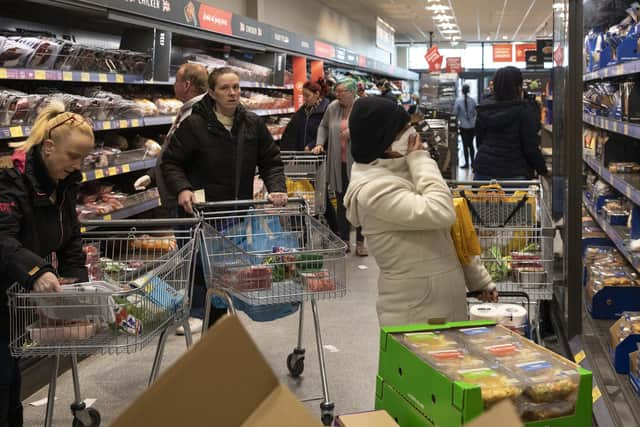'Dark supermarkets' offer groceries delivered to your door within minutes. But such convenience has a cost – Stephen Jardine
They weren’t very fancy but they were on your doorstep and seemingly open all hours.
Then came American-style supermarkets and, with increased car use, the corner shop market declined. We shopped bigger but less often leaving convenience stores with a dwindling market share.
Advertisement
Hide AdAdvertisement
Hide AdA pandemic later, we are in a very different place. We shop for clothes online, supermarkets offer home delivery and dinner comes on a bike from your favourite restaurant or takeaway. Extreme convenience is now how we live our lives but can it ever go too far?
In London, ‘dark supermarkets’ are on the rise and they are heading our way. They have snapped up empty units where local shops have gone out of business, tend to operate behind blacked-out windows and aren’t open to the public. Instead the stores act as convenience hubs where last-minute shopping orders are despatched to local addresses via bike or moped delivery.
In some, staff are expected to put the order together within 90 seconds with the aim of getting it out the door, down the street and to a customer’s house within ten minutes.
At the moment, there are 200 of these stores operated by brands like Getir, Jiffy and Zapp but forecasts by the market research firm Interact Analysis suggest there could be as many as 1,500 in the next few years.


Common purchases include chocolate, crisps and alcohol but while some have a £10 minimum order, others will deliver a single apple if you are prepared to pay the £1.99 delivery charge.
The companies market themselves as modern convenience stores, delivering those vital ingredients you need for dinner or helping hard-pressed parents who are bathing the kids but have run out of nappies. They also stress they sell some pharmaceuticals like paracetamol for when you feel too ill to even leave your front door.
But at what price? During a cost-of-living crisis, paying someone to bring crisps and wine to your door because you can’t be bothered to get off the sofa and walk to the shops has a whiff of the Marie Antoinette about it. And that’s before we talk about the national obesity situation.
There are also issues around infrastructure. In Amsterdam there is currently a freeze on dark store openings while city councillors work out plans for rules on rapid delivery couriers. Residents have complained about disruption caused by reckless cycling to meet deadlines and delivery bikes littering pavements.
Advertisement
Hide AdAdvertisement
Hide AdThe blacked-out windows and constant courier traffic also don’t make for a welcoming High Street environment for shoppers or other stores trying to build a business.
All of this may be academic. Few, if any, of these dark store brands seem to be currently making money. Like Uber and Deliveroo, they are simply trying to hold out longest based on the deepest pockets while all their rivals go out of business.
But before that happens you may well see them on a street near you so local authorities would be wise to think now about the planning implications and the wider issues around this new wave of retail delivery.
Convenience is great but sometimes it comes at a price.
Comments
Want to join the conversation? Please or to comment on this article.
